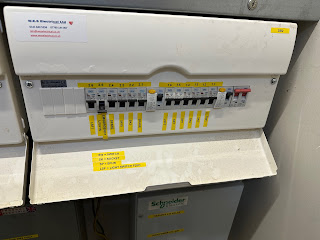
The Essential Guide to Emergency Electricians in Shawlands and Surrounding Areas of Glasgow
Introduction
When an electrical emergency strikes, having a reliable and skilled electrician just a call away can be a lifesaver. For residents and businesses in Shawlands and the surrounding areas of Glasgow, knowing who to contact in such critical moments is crucial. This blog will guide you through the importance of emergency electricians, the services they offer, and why you should prioritize obtaining an Electrical Installation Condition Report (EICR).
Why You Might Need an Emergency Electrician Shawlands
Electrical emergencies can occur at any time, often without warning. Here are some common scenarios where an emergency electrician is necessary:
- Power Outages: Unexpected power cuts can disrupt your daily routine or business operations. An emergency electrician can quickly identify and resolve the issue, restoring normalcy.
- Electrical Fires: Faulty wiring or overloaded circuits can lead to electrical fires. Immediate intervention by an emergency electrician is crucial to prevent damage and ensure safety.
- Burning Smell or Sparks: If you notice a burning smell or see sparks from your electrical outlets, it’s essential to contact an emergency electrician to prevent potential fires.
- Water Damage: Water and electricity are a dangerous combination. If your property has suffered water damage, an emergency electrician can assess and repair any affected electrical systems.
Services Offered by Emergency Electricians in Shawlands
Emergency electricians provide a wide range of services to address urgent electrical issues. These services include:
- 24/7 Availability: Electrical emergencies don’t follow a schedule, and neither do emergency electricians. They are available around the clock to ensure your safety and comfort.
- Fault Finding and Repairs: Quick identification of electrical faults and immediate repair services to restore functionality.
- Safety Inspections: Comprehensive safety inspections to prevent future emergencies and ensure your property complies with safety standards.
- Temporary Solutions: Providing temporary power solutions to keep your home or business running until a permanent fix can be made.
The Importance of EICR (Electrical Installation Condition Report)
An EICR is a thorough examination of your property’s electrical systems and installations, ensuring they are safe and compliant with current standards. Here’s why an EICR is vital:
- Safety: Regular inspections can identify potential hazards before they become emergencies, ensuring the safety of occupants.
- Compliance: Landlords are legally required to ensure the electrical safety of their rental properties. An EICR helps meet these obligations.
- Insurance: Many insurance companies require proof of a valid EICR to process claims related to electrical issues.
- Peace of Mind: Knowing that your electrical systems are in good condition provides peace of mind, reducing the risk of unexpected failures.
Choosing the Right Emergency Electrician
When selecting an emergency electrician in Shawlands and the surrounding areas, consider the following:
- Qualifications and Certifications: Ensure the electrician is fully qualified and certified to perform emergency repairs.
- Experience: Experienced electricians are more likely to quickly diagnose and resolve issues.
- Reputation: Look for electricians with positive reviews and a good reputation in the community.
- Response Time: Choose an electrician known for prompt response times to minimize the impact of electrical emergencies.
Conclusion
Electrical emergencies require immediate attention to protect your property and ensure safety. Residents and businesses in Shawlands and the surrounding areas of Glasgow can rely on qualified emergency electricians to address urgent issues effectively. Additionally, obtaining an EICR is a proactive step in maintaining electrical safety and compliance. Stay prepared, stay safe, and ensure your electrical systems are always in top condition.
For reliable emergency electrical services and EICR inspections, don't hesitate to contact your local professionals in Shawlands today.




